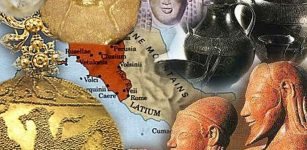Ancient Venetian Merchants Were Always Prepared For The Worst
Ellen Lloyd - AncientPages.com - Beautiful Venice in Italy is today recognized as one of the most charming cities in the world, and its ancient history is just as fascinating as this magnificent place's unique atmosphere.
J.M.W. Turner - Venice, The Dogana and San Giorgio Maggiore, 1834 - Credit: Public Domain
"In 1581, Francesco Sansovino, a Venetian who greatly admired his city, wrote that the name Venice derived from the Latin phrase Venietiam, which he said meant "come back again, and again, for however many times you come you will always see new and beautiful things." 1
This assumption concerning the origin of the name may not be accurate, but many still think Venice is like no other city in the world.
While strolling along the picturesque streets or enjoying the ride in a gondola, one can recall the daily life of 13th-century Venetian merchants who sometimes faced many dangers in the city.
A long time ago, Venice was merely a fishing village, but this small settlement eventually became one of Europe's most powerful states.
As John D. Irany writes in his book Venice in History, "the history of Venice is about simple things: the price of cloth, the design of ships, the transportation of spices and other goods. And it is about how such simple things affect the power and prosperity of nations. Like the Venetians themselves, we must approach their history from a worldview.
For hundreds of years, Venice was rich when the nations of the rest of Europe were poor. While London, Paris, and Rome were mired in the Dark Ages of Medievalism, the Republic of Venice–the Serene Republic–expanded in commerce, art, learning, and power. As such, Venice played a crucial role in the dynamic development of Europe.
In time, the changing fortunes of world events would allow other nations to challenge Venice's pre-eminent status successfully.
Bassanio, a theatrical character in Shakespeare's play "The Merchant of Venice" - Credit: Public Domain
But five hundred years ago, and for a thousand years before Columbus set sail to find a westward route to Asia, the Republic of Venice was the most exciting place. The citizens of the European nations that would later become great powers—England, France, Spain, and the Netherlands—could look only wistfully at the prosperity and wealth of the Venetians.
The Venetians readily expended their wealth on artistic and scientific achievement. Bellini, Tintoretto, Giorgione, and Titian were great masters of painting. The architects Andrea Palladio, Baldassare Longhena, and Jacopo Sansovino created churches, palaces, and even administrative offices of unsurpassed beauty. Galileo made his first astronomical discoveries while a professor at the Republic's university and later referred to his time in Venice as "the happiest years of his life."
With seemingly inexhaustible economic resources and unabated confidence in a bountiful future, Venetians built the glorious city that captivates all who see it, even today. In art, architecture, and scientific accomplishment, Venice in its time was the center of the world." 1
Though all this may give a glorying picture of Venice, one must remember life for the city's merchants during the 13th century was not always a luxury. During the 13th century, Italy was a collection of independent city-states, and to survive and prosper as a Venetian merchant, one had to have influential contacts or be friends with the most powerful families.
Using conflicts and wars to one's advantage could make a person tremendously rich. The Crusaders needed horses, soldiers, and ships. A cunning merchant would do all he could to offer transport and supplies at the highest possible price. This may sound a bit heartless, but a merchant's good life could change quickly because a failed harvest and the spread of diseases could end prosperity for a long time. Rivals and competition were a re-occurring problem in a place like Venice because this was "the city of choice for many merchants who utilized its European and Asian trade in the Holy Roman and Byzantine Empires." 2
Knowledge of the best trade routes was of utter importance if one wished to be successful, so merchants always wore a compass. Profitable goods, such as silk and spices, were highly desired products of Asia, but sweet Greek wine was also in high demand.
Even today, the first impression is often said last, and Venetian merchants take no risks when dealing with their clients. Wearing clean and fashionable clothes was a sign of confidence meant to reflect a trustworthy business person. Violence was naturally not uncommon, and carrying a dagger and a good sword was necessary. It happened when a merchant's ship or goods were stolen, and one had to defend property and sometimes life.
One can easily say Venetian merchants had to be prepared for the worst and always on their guard. Still, looking through our modern eyes, one cannot help wondering if this could have occasionally been forgotten in such a beautiful city as Venice.
Written by Ellen Lloyd – AncientPages.com
Updated on December 11, 2023
Copyright © AncientPages.com All rights reserved. This material may not be published, broadcast, rewritten or redistributed in whole or part without the express written permission of AncientPages.com
Expand for references- John D Irany - Venice in History: A History of the Serene Republic for Travelers
- Kevin McGivern – Trade, All About History, Issue 033
More From Ancient Pages
-
 Never-Ending Battles Between God Ra And Indestructible Apophis In Ancient Egyptian Beliefs
Egyptian Mythology | May 20, 2021
Never-Ending Battles Between God Ra And Indestructible Apophis In Ancient Egyptian Beliefs
Egyptian Mythology | May 20, 2021 -
 Homo Bodoensis Is A New Species Of Human Ancestors Who Lived Half A Million Years Ago
Archaeology | Nov 1, 2021
Homo Bodoensis Is A New Species Of Human Ancestors Who Lived Half A Million Years Ago
Archaeology | Nov 1, 2021 -
 Why Did Ancient Romans Cut Off Their Thumbs?
Ancient History Facts | Mar 2, 2020
Why Did Ancient Romans Cut Off Their Thumbs?
Ancient History Facts | Mar 2, 2020 -
 Mireuksa Pagoda: Largest And One Of The Oldest Of Korean Pagodas
Archaeology | Jan 1, 2016
Mireuksa Pagoda: Largest And One Of The Oldest Of Korean Pagodas
Archaeology | Jan 1, 2016 -
 Earliest Fascinating Concepts Of Artificial Intelligence And Robots In Ancient Myths – Examined
Archaeology | Mar 6, 2019
Earliest Fascinating Concepts Of Artificial Intelligence And Robots In Ancient Myths – Examined
Archaeology | Mar 6, 2019 -
 On This Day In History: Most Notorious Roman Emperor Nero Committed Suicide – On June 9, 68 AD
News | Jun 9, 2016
On This Day In History: Most Notorious Roman Emperor Nero Committed Suicide – On June 9, 68 AD
News | Jun 9, 2016 -
 Enigma Of Lycurgus Of Sparta – Great Reformer And His Foundation Of A Warlike Superior State
Featured Stories | Jan 9, 2023
Enigma Of Lycurgus Of Sparta – Great Reformer And His Foundation Of A Warlike Superior State
Featured Stories | Jan 9, 2023 -
 Imhotep: Ancient Genius And Architect Of The Sakkara Pyramid
Featured Stories | Mar 7, 2016
Imhotep: Ancient Genius And Architect Of The Sakkara Pyramid
Featured Stories | Mar 7, 2016 -
 Secrets Of A Lake That Could Re-Write Ancient History Of America – Interesting Artifacts And Buildings – Part 2
Artifacts | Jun 5, 2018
Secrets Of A Lake That Could Re-Write Ancient History Of America – Interesting Artifacts And Buildings – Part 2
Artifacts | Jun 5, 2018 -
 Ancient Maya Reservoirs Contained Toxic Pollution – New Study
Archaeology | Jun 27, 2020
Ancient Maya Reservoirs Contained Toxic Pollution – New Study
Archaeology | Jun 27, 2020 -
 What Does The Brain Of The Homo Erectus Fossil With The Lowest Cranial Capacity Tell About Evolution?
Archaeology | Mar 2, 2023
What Does The Brain Of The Homo Erectus Fossil With The Lowest Cranial Capacity Tell About Evolution?
Archaeology | Mar 2, 2023 -
 Buried Ancient Roman Glass Has Formed Photonic Crystals – Extraordinary Discovery – Scientists Say
Ancient Technology | Sep 25, 2023
Buried Ancient Roman Glass Has Formed Photonic Crystals – Extraordinary Discovery – Scientists Say
Ancient Technology | Sep 25, 2023 -
 Great Flood Myth Told By Klallam People Of Washington’s Olympic Peninsula – Confirmed
Archaeology | May 17, 2019
Great Flood Myth Told By Klallam People Of Washington’s Olympic Peninsula – Confirmed
Archaeology | May 17, 2019 -
 Ancient Board Game Mancala Can Unlock Cutting-Edge Physics Discoveries
Artifacts | Sep 30, 2023
Ancient Board Game Mancala Can Unlock Cutting-Edge Physics Discoveries
Artifacts | Sep 30, 2023 -
 Saint Botvid – Viking Who Was Killed By A Slave He Granted Freedom
Featured Stories | Apr 10, 2023
Saint Botvid – Viking Who Was Killed By A Slave He Granted Freedom
Featured Stories | Apr 10, 2023 -
 Unusual Ancient Human Bones Found In A Grave In Derbyshire – Burial Place Of A Legendary Person?
Featured Stories | Apr 24, 2024
Unusual Ancient Human Bones Found In A Grave In Derbyshire – Burial Place Of A Legendary Person?
Featured Stories | Apr 24, 2024 -
 On This Day In History: Gutenberg Prints The First Bible – On Feb 23, 1455
News | Feb 23, 2017
On This Day In History: Gutenberg Prints The First Bible – On Feb 23, 1455
News | Feb 23, 2017 -
 Mysterious Etruscans: Skilled Sailors And Master Craftsmen
Civilizations | Mar 1, 2016
Mysterious Etruscans: Skilled Sailors And Master Craftsmen
Civilizations | Mar 1, 2016 -
 Secret Ancient Lunar Calendar May Be Hidden At A Hittite Sanctuary
Archaeology | Jul 3, 2019
Secret Ancient Lunar Calendar May Be Hidden At A Hittite Sanctuary
Archaeology | Jul 3, 2019 -
 Did The Unique Gjermundbu Viking Helmet Belong To A Warrior Who Served Rulers In The East?
Archaeology | Feb 8, 2022
Did The Unique Gjermundbu Viking Helmet Belong To A Warrior Who Served Rulers In The East?
Archaeology | Feb 8, 2022


